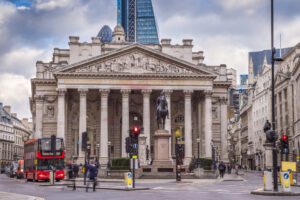The Bank of England has pushed up the cost of borrowing to its highest level in nearly 15 years amid concerns that inflation will persist.
The central bank raised interest rates by a quarter of a percentage point to 4.25 per cent, its highest level since November 2008, in the latest increase as the central bank races to tame inflation that has stayed in double digits.
Rates have now risen by 4.15 points in eleven rate rises since December 2021, when they were at a historical low of 0.1 per cent. It is the fastest tightening of monetary policy since the Bank took responsibility for interest rates in the late 1990s.
The consumer prices index, which is the headline measure of inflation, surprised forecasters with a rise to 10.4 per cent last month, up from 10.1 per cent at the start of the year owing to stubbornly high food prices. Economists had predicted a fall to below 10 per cent, continuing the decline from a 41-year high of 11.1 per cent in October. The Bank’s target is 2 per cent.
Rate setters said that the cost of borrowing should rise because, although wages rises in the private sector were slower than expected and unemployment remained low, there are signs that strong demand in the UK and overseas is being driven by more than just the fall in energy prices. “Renewed and sustained demand for [workers] could still reinforce the persistence of higher costs in consumer prices,” even if there is less feed-through from energy prices to the wider economy, officials said in the meeting minutes.
The cost of living crisis has mainly been driven by the soaring cost of energy and food, which has squeezed household incomes. Wholesale gas prices have more than halved in recent months, however, and some forecasters have said that this could push energy bills below the £2,000 threshold later this year.
Growth in average weekly earnings in the private sector slowed to 7 per cent in January, a fraction below the Bank’s forecast for the period. Unemployment remained close to a historical low at 3.7 per cent.
Two rate setters, whose vote to hold interest rates at 4 per cent put them in a minority on the nine-strong committee, said that the impact of previous rate rises had yet to feed through to the economy and keeping rates as they were would have pushed inflation below the 2 per cent target in the coming years, which would mean that rate setters need to start cutting interest rates sooner.
The decision follows the Federal Reserve’s decision yesterday to increase interest rates in the United States by a quarter of a percentage point to a target range of between 4.75 and 5 per cent, the highest level since 2007. Its chairman, Jerome Powell, said after the decision that policymakers had considered holding rates steady as regulators scrambled to shore up confidence in the banking system.
The Bank of England said it had considered the impact of volatility in financial markets in recent weeks, caused by the failure of Silicon Valley Bank and the lead up to UBS’s purchase of Credit Suisse, but it believed that the UK banking system “remained resilient” and it would closely monitor any future changes in the availability or cost of credit.
Interest rate rises are used to push up the cost of borrowing and improve the return on saving to encourage people to save rather than spend. This is expected to reduce demand in the economy and, in turn, prices.
The rate setters said that they would continue to monitor how much slack there is in the jobs market, as well as pay growth and inflation in the price of services, which account for the lion’s share of the economy. “If there were to be evidence of more persistent pressures, then further tightening in monetary policy would be required,” they said.
The Bank said in its February projections that it expected inflation to more than halve to 4 per cent by the end of the year. The Office for Budget Responsibility, the government’s tax and spending watchdog, was more optimistic, predicting in its forecast last week a fall to 2.9 per cent. The official forecaster expects the economy to avoid a recession but growth is expected to stagnate this year.
Read more:
UK interest rates rise to 4.25% after Bank of England decision



























